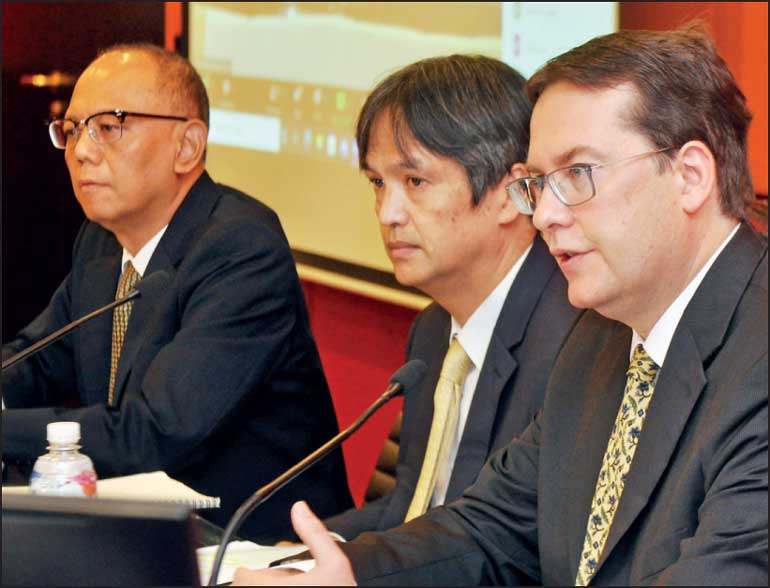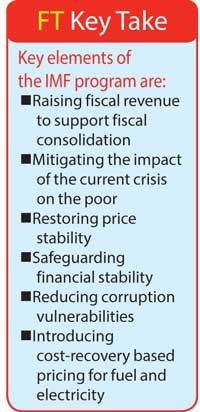Wednesday Feb 25, 2026
Wednesday Feb 25, 2026
Friday, 2 September 2022 00:00 - - {{hitsCtrl.values.hits}}

IMF staff mission Co-Lead Peter Breuer (right) along with Co-Lead Masahiro Nozaki (centre) and Resident Representative for Sri Lanka Tubagus Feridhanusetyawan at the media briefing in Colombo on the Staff-Level Agreement reached with the Government yesterday – Pic by Lasantha Kumara
By Nisthar Cassim
 The International Monetary Fund (IMF) yesterday called for quicker agreement by creditors on relief to ensure the crisis in Sri Lanka doesn’t worsen to a humanitarian one.
The International Monetary Fund (IMF) yesterday called for quicker agreement by creditors on relief to ensure the crisis in Sri Lanka doesn’t worsen to a humanitarian one.
The appeal follows the IMF and the Government reaching a Staff-Level Agreement (SLA) for a 48-month (four years) Extended Fund Facility (EFF) worth $ 2.9 billion.
Debt relief from creditors is a critical condition for the IMF Executive Board to approve the program and release funds since Sri Lanka suspended servicing of external debt worth $ 47 billion from 12 April and is classified as a default sovereign facing serious debt sustainability issues.
“Debt relief is important for Sri Lanka’s debt sustainability. If there is no agreement by creditors it will deepen the crisis and undermine Sri Lanka’s future repayment capacity. Therefore, it is in the interest of all creditors to coordinate faster with transparent collaboration to help Sri Lanka,” IMF staff mission Co-Lead Peter Breuer told journalists yesterday.
“Sri Lanka is facing a deep crisis. Delay would deepen the crisis further and lead it to a humanitarian crisis,” he stressed at the briefing along with Co-Lead Masahiro Nozaki.
The IMF yesterday revealed it forecasts Sri Lanka’s economy to contract by 8.7% and the crisis impact has been disproportionately borne by the poor and vulnerable.
Noting that the IMF is here to help the people of Sri Lanka, Breuer said that a quicker settlement with creditors can help the country emerge from the crisis and get back to a path of prosperity and debt sustainability.
It was clarified that the IMF is not part of the negotiations between creditors and Sri Lanka but neutral and only helping the process as the Government is being advised by specialist firms Lazard Ltd., and Clifford Chance LLP.
Breuer emphasised that with the Staff-Level Agreement reached, the process can be expedited as the SLA can give assurance to creditors that Sri Lanka is on a serious reforms path.
Experts have opined that Sri Lanka will find bringing China onboard for a fair and transparent settlement challenging. China accounts for around 13% of Sri Lanka’s external debt.
Breuer refused to give a timeline though the Central Bank of Sri Lanka Governor Dr. Nandalal Weerasinghe had indicated receipt of the first tranche by end 2022. “It is very difficult to anticipate a timeline. We hope it can be quick though, in the past, some countries have taken a longer time,” he added.
“The SLA is the beginning of a long road that Sri Lanka needs to continue with determination, taking ownership of and implementing the necessary reforms. Sri Lanka needs to secure support from all segments and progress towards ensuring prosperity to all,” Breuer added.
Mission Co-Lead Masahiro Nozaki said the SLA will be a catalyst for additional direct support from Sri Lanka’s development partners and multilateral organisations.
In a statement, IMF said the objectives of Sri Lanka’s new Fund-supported program are to restore macroeconomic stability and debt sustainability, while safeguarding financial stability, protecting the vulnerable, and stepping up structural reforms to address corruption vulnerabilities and unlock Sri Lanka’s growth potential.
It said the agreement is subject to the approval by IMF management and the Executive Board in the period ahead, contingent on the implementation by the authorities of prior actions, and on receiving financing assurances from Sri Lanka’s official creditors and making a good faith effort to reach a collaborative agreement with private creditors. Debt relief from Sri Lanka’s creditors and additional financing from multilateral partners will be required to help ensure debt sustainability and close financing gaps.
Nozaki also said the IMF was happy with the recent announcement on slew of reforms and other measures taken to improve stability. He said prior actions include the upcoming 2023 Budget being consistent with the macro-economic program agreed. He added that a creditor-debtor forum is also an important step in reaching an early settlement.
In its statement the IMF said: “Sri Lanka has been facing an acute crisis. Vulnerabilities have grown owing to inadequate external buffers and an unsustainable public debt dynamic. The April debt moratorium led to Sri Lanka defaulting on its external obligations, and a critically low level of foreign reserves has hampered the import of essential goods, including fuel, further impeding economic activity. The economy is expected to contract by 8.7% in 2022 and inflation recently exceeded 60%. The impact has been disproportionately borne by the poor and vulnerable.
“Against this backdrop, the authorities’ program, supported by the Fund, would aim to stabilise the economy, protect the livelihoods of the Sri Lankan people, and prepare the ground for economic recovery and promoting sustainable and inclusive growth.”
Key elements of the program are:
The IMF team held meetings with President and Finance Minister Ranil Wickremesinghe, Prime Minister Dinesh Gunawardena, Central Bank of Sri Lanka Governor Dr. P. Nandalal Weerasinghe, Secretary to the Treasury K.M. Mahinda Siriwardana, and other senior Government and CBSL officials. It also met with Parliamentarians, representatives from the private sector, civil society organisations and development partners.
“We would like to thank the authorities for their candid approach and warm hospitality and are looking forward to continuing our engagement in support of Sri Lanka and its people,” the statement added.
